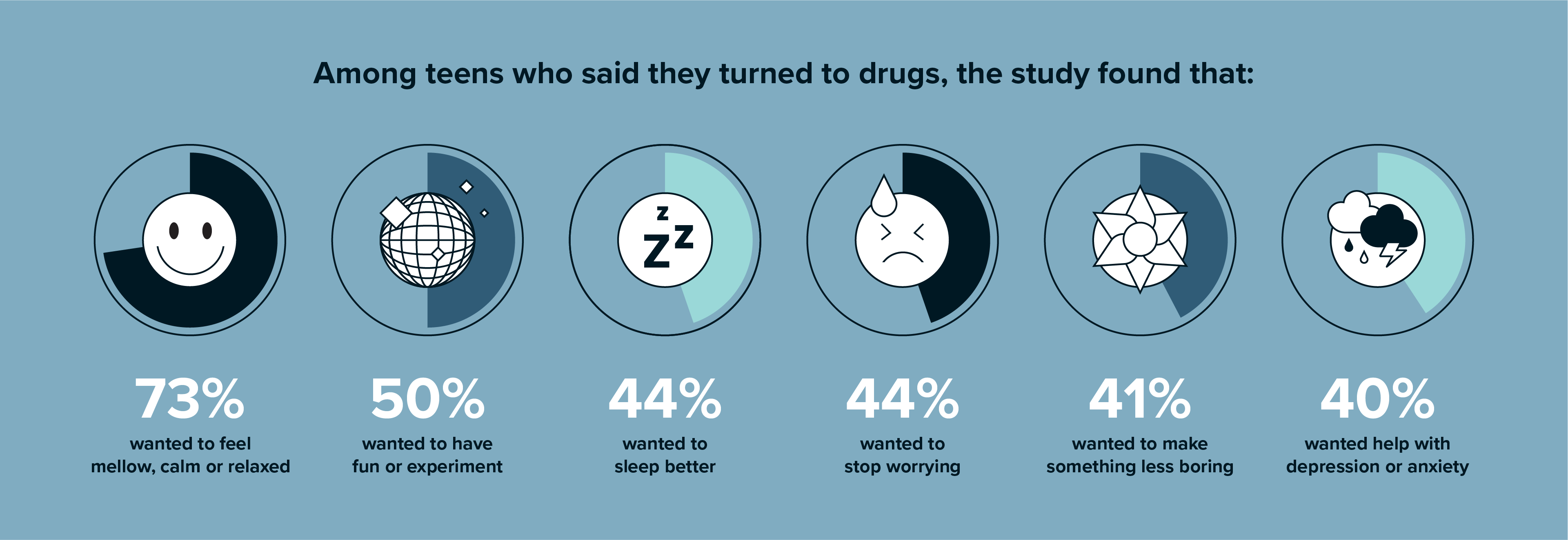Addressing Teen Mental Health Can Help Nip Substance Misuse in the Bud
As a parent you may sometimes wonder, “Why does my teen turn to substance misuse?”
For parents of teens who are misusing cough medicine and/or other over-the-counter (OTC) substances, it can be difficult to understand their reasoning for doing so and, more importantly, how to best help them. A new study by the Center of Disease Control (CDC) offers critical insights into the most common motivations and behaviors of teens with substance use disorders.
Among teens who said they turned to drugs, the study found that:
- 73% turned to substances to feel mellow, calm, or relaxed
- 50% turned to substances to have fun or experiment
- 44% used substances to sleep better
- 44% turned to substances to stop worrying
- 41% turned to substances to make something less boring
- 40% turned to it to help with depression and anxiety

This isn’t the first time the connection between mental health and substance misuse has been drawn and this study further cements that connection. The fact of the matter is that many teens today face lots of stress academically, socially, and personally and they don’t always know how to cope. Not to mention, the changing social landscape during the pandemic further exacerbated loneliness among young adults, leading to worsening symptoms of anxiety and depression. Some teens are turning to drugs and substances to relax and escape worries.
Parents, though, have the power to get through to their teens in ways no one else can. As guiding figures in teen’s lives, parents are uniquely positioned to prevent their teens from misusing substances by connecting with them and setting good examples of healthy behavior. But if you’re concerned your teen has developed unhealthy behaviors around OTC medicines or other substances, the first step is to be on the lookout for warning signs.
Warning signs of substance use include:
- Empty drug or medicine containers or drug paraphernalia
- Change in your teen’s friends
- Change in eating or sleeping patterns
- Changes in physical appearance and hygiene
- Declining grades
- Loss of interest in hobbies or favorite activities
- Hostile and uncooperative attitude
- Unexplained disappearance of household money
- Unusual chemical or medicinal smells on your teen or in their room
After identifying any of these signs, it’s important to talk to teens directly and compassionately.
Approach the conversation with curiosity instead of asking accusatory questions and try to uncover the root of their substance misuse behavior. Pinpointing the source of your teen’s stress and anxiety can be essential in helping them feel better in the long term. Having these conversations isn’t easy, of course, but they can be easier if you talk with your teen instead of at them.
A shocking revelation from the CDC study revealed 50% of the teens assessed admitted to using drugs by themselves, which illustrates that many teens struggle silently and feel alone when handling stress and anxiety. Equipping your teen with the knowledge and understanding of how stress and mental health struggles can potentially lead to risky behaviors is essential in helping them understand their own coping mechanisms and how to instill positive, lasting behavior change.
It may also help to practice being sympathetic and reflecting on what life was like for you as a teenager, and how frustrating it may have been to have disciplinary conversations with your parents or guardians. Find ways to help your teen build confidence and learn how to navigate mental health struggles, whether that be through therapy, hobbies that help them destress, spending more quality time together, or offering to help reprioritize their responsibilities. By supporting them in this way, you can help them practice healthier habits moving forward without limiting their sense of independence.
Ultimately, understanding why your teen is misusing substances opens the door for you to work together to address the root of the problem and nip their substance misuse in the bud.
Take Action
Increased awareness can only mean increased prevention. Join us in the fight against teen cough medicine abuse by exploring and sharing our free resources.
